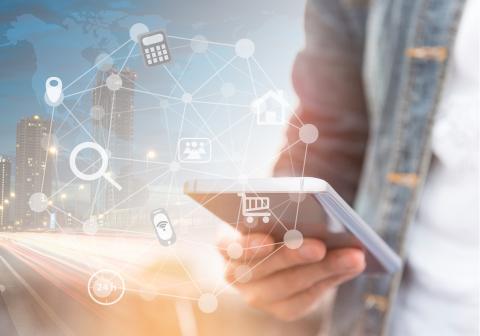Thanks to new technological developments, Ukrainians are now able to use “mobile money”. The advent of this service, used worldwide, was made possible thanks to an improvement in the business climate supported by the Better Regulation Delivery Office (BRDO), financed by the European Union as part of the FORBIZ project.
In Ukraine, almost 35% of the population of 16 million have no regular access to banking services. Those most affected are people who live in small towns and villages where there are no financial institutions. In Ukraine, there are only 9,500 bank branches for 30,000 communities.
The most convenient means of payment for these people would be a cash transfer system, which allows for online shopping and online payment of utilities, just to cite a few possibilities.
However, a new technology might be at hand to alleviate the problem, namely mobile phone payments from your bank account, a method that is developing particularly rapidly in countries that do not have adequate banking coverage. The inhabitants of almost 100 countries worldwide are now using this system as an alternative. “You can pay for a trip on the metro in Prague by SMS, for instance,” says Ihor Samokhodsky, an expert from the BRDO IT sector. “You don’t need a bank card to pay for Apple services in Singapore, just a mobile phone.”
All the more reason to use it then, since access facilities in Ukraine are in full working order: there is 100% mobile coverage and the number of sim-cards is 1.2 times higher than the number of citizens.
Regulations in Ukraine however, are holding back progress, as mobile accounts can only be used, in practice, for telecommunications services, says Samokhodsky.
Technology overtakes legislation
The Ukrainian government has passed a resolution to scrap obsolete legislation from mid-2017 onwards. The Better Regulation Delivery Office (BRDO), which is responsible for improving the business environment in Ukraine as part of the EU4Business FORBIZ programme, initiated and developed the document.
Ihor Samokhodsky says the BRDO consulted dozens of businesses before the document was drawn up. “The most powerful service providers were very interested in the deregulation question,” he says. No surprise there! Ultimately, the new technology means that they will be able to widen their list of services and increase their revenue per single subscriber, which is one of the lowest in the world, almost five times less than in neighbouring Poland.
The demand for a new type of payment among network providers is illustrated by the fact that – witnessing the frantic pace of technological development in neighbouring countries – Ukrainian mobile companies have also tried to further deregulate by offering their services through third-party companies.
The market giant Kyivstar launched “Mobile Money” services as far back as 2013. Taras Gorkun, the head of the company’s mobile financial services, told the Ukrainian online publication Liga.net that the service existed in test mode because they viewed it as temporary. As a result, Gorkun noted that, from a base of 26 million subscribers, only 2.5 million transactions were carried out over the mobile network in 2016 – that is to say, less than 1% of their customers used the service.
New business possibilities
So far, only one of the three service providers in Ukraine - Lifecell – is offering “mobile money” as a service. The others are in the process of preparing to do so. Connecting their customers to the new technology will mean the emergence of a huge new market. According to experts from the BRDO, its annual turnover could be from USD 43.3 to USD 86.7 million, and the number of users could reach between 5.2 and 10.5 million.
A large market providing vast opportunities for business expansion would also benefit more modest businesses. This would primarily affect E-commerce, which saw a 30% growth in Ukraine in 2017, reaching a value of EUR 1.5 billion. “There would be faster payment solutions, a large turnover, and cost savings. Such a service would make sound economic sense,” said Maksym Nefyodov, the First Deputy Minister for Economic Development and Trade, explaining the benefits to business at a round table dealing with ‘Mobile Payments: a New Opportunity for Everyone’.
These are a few examples of cost savings. Small and micro-enterprises will be able to take non-cash payments for their goods and services, without any additional charges for the purchase and maintenance of POS terminals. They would take money from ‘mobile wallets’ and online stores for whom providing couriers to deliver goods is expensive using the old terminals. All in all, SMEs would have another payment channel for their goods and services.
In addition to being convenient for users and providing new opportunities for businesses, mobile money has another valuable function : it will mean that the Ukrainian economy can emerge from the shadows and stimulate the growth of its GDP. The transition from a cash-payment system to a cash-transfer system will increase the transparency of the financial system in general and business in particular. In fact, the National Bank of Ukraine adopted the idea of a cashless economy in 2016 as part of its strategy to revitalise the country’s financial system. Developing electronic channels for payment, including mobile ones, is one of the key elements in this process.
*********************************
The BRDO is funded by the European Union within the framework of the EU4Business FORBIZ project, with the aim of simplifying the process of doing business and providing effective state regulation in key sectors of the economy. FORBIZ supports Ukraine’s reform agenda and its economic recovery by proposing a systemic change to a more business-friendly environment with a particular focus on SMEs. The project seeks to steer a shift in policy towards greater recognition of SMEs and the vital role they play in economic recovery, while addressing the challenge of reducing regulatory burden and lessening risk for businesses.
Author: Kateryna Shapoval
The article is prepared in the framework of the EU4Business Initiative

